The Impact of Climate Change on Agriculture and U.S. Economy
VerifiedAdded on 2023/06/09
|5
|1128
|126
Essay
AI Summary
This essay examines the significant impact of climate change on agriculture, particularly in the U.S., highlighting the interconnectedness of climate and agricultural productivity. It argues that increasing climate disruptions can lead to drastic decreases in crop and livestock production, affecting the sustainability of life. The essay discusses how changes in temperature, rainfall, and carbon dioxide levels influence crop yields and livestock metabolism, ultimately impacting the U.S. economy, food security, and the survival of vulnerable populations. While preliminary measures have been taken, the essay concludes that larger-scale efforts and increased awareness are necessary to combat the detrimental effects of climate change on agriculture and ensure long-term sustainability.
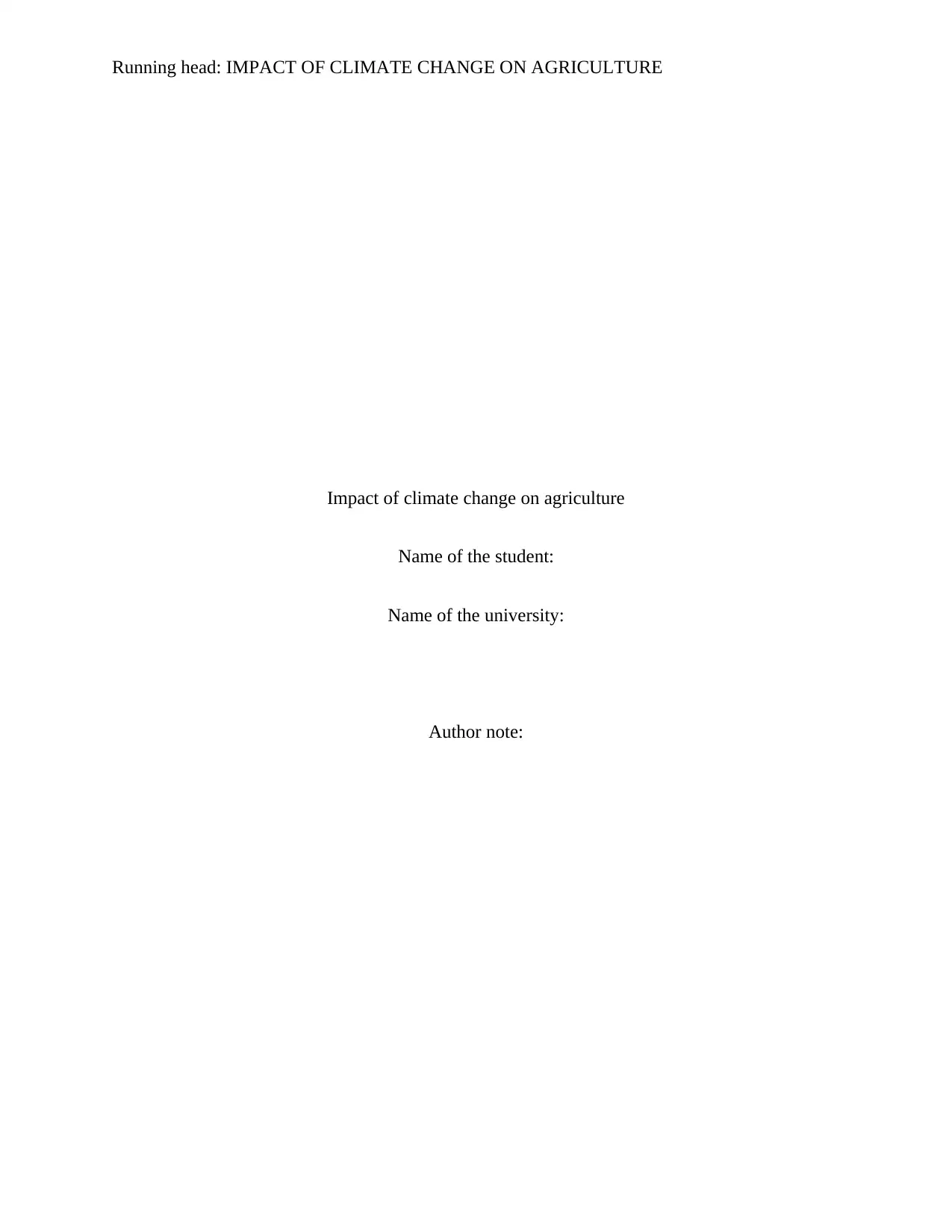
Running head: IMPACT OF CLIMATE CHANGE ON AGRICULTURE
Impact of climate change on agriculture
Name of the student:
Name of the university:
Author note:
Impact of climate change on agriculture
Name of the student:
Name of the university:
Author note:
Paraphrase This Document
Need a fresh take? Get an instant paraphrase of this document with our AI Paraphraser
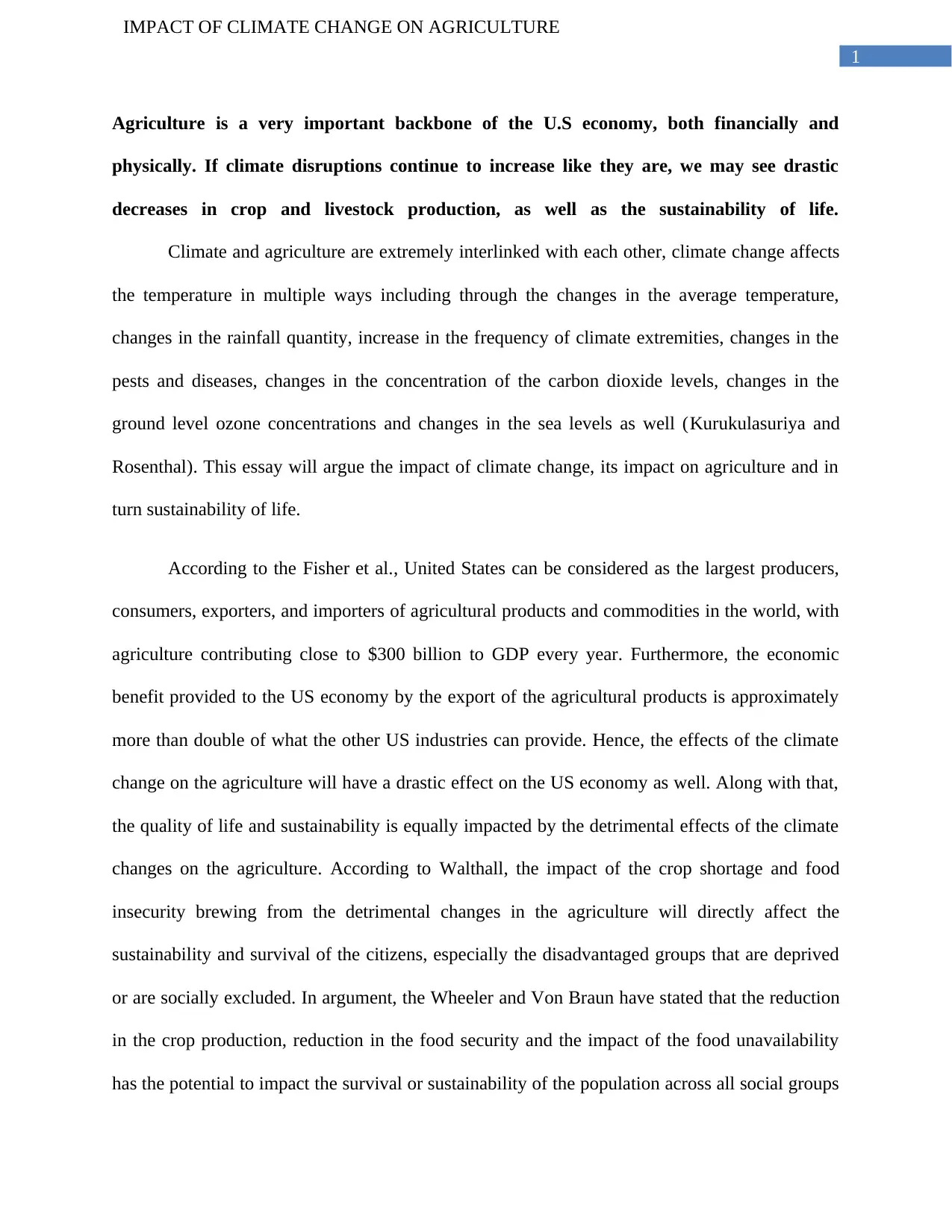
1
IMPACT OF CLIMATE CHANGE ON AGRICULTURE
Agriculture is a very important backbone of the U.S economy, both financially and
physically. If climate disruptions continue to increase like they are, we may see drastic
decreases in crop and livestock production, as well as the sustainability of life.
Climate and agriculture are extremely interlinked with each other, climate change affects
the temperature in multiple ways including through the changes in the average temperature,
changes in the rainfall quantity, increase in the frequency of climate extremities, changes in the
pests and diseases, changes in the concentration of the carbon dioxide levels, changes in the
ground level ozone concentrations and changes in the sea levels as well (Kurukulasuriya and
Rosenthal). This essay will argue the impact of climate change, its impact on agriculture and in
turn sustainability of life.
According to the Fisher et al., United States can be considered as the largest producers,
consumers, exporters, and importers of agricultural products and commodities in the world, with
agriculture contributing close to $300 billion to GDP every year. Furthermore, the economic
benefit provided to the US economy by the export of the agricultural products is approximately
more than double of what the other US industries can provide. Hence, the effects of the climate
change on the agriculture will have a drastic effect on the US economy as well. Along with that,
the quality of life and sustainability is equally impacted by the detrimental effects of the climate
changes on the agriculture. According to Walthall, the impact of the crop shortage and food
insecurity brewing from the detrimental changes in the agriculture will directly affect the
sustainability and survival of the citizens, especially the disadvantaged groups that are deprived
or are socially excluded. In argument, the Wheeler and Von Braun have stated that the reduction
in the crop production, reduction in the food security and the impact of the food unavailability
has the potential to impact the survival or sustainability of the population across all social groups
IMPACT OF CLIMATE CHANGE ON AGRICULTURE
Agriculture is a very important backbone of the U.S economy, both financially and
physically. If climate disruptions continue to increase like they are, we may see drastic
decreases in crop and livestock production, as well as the sustainability of life.
Climate and agriculture are extremely interlinked with each other, climate change affects
the temperature in multiple ways including through the changes in the average temperature,
changes in the rainfall quantity, increase in the frequency of climate extremities, changes in the
pests and diseases, changes in the concentration of the carbon dioxide levels, changes in the
ground level ozone concentrations and changes in the sea levels as well (Kurukulasuriya and
Rosenthal). This essay will argue the impact of climate change, its impact on agriculture and in
turn sustainability of life.
According to the Fisher et al., United States can be considered as the largest producers,
consumers, exporters, and importers of agricultural products and commodities in the world, with
agriculture contributing close to $300 billion to GDP every year. Furthermore, the economic
benefit provided to the US economy by the export of the agricultural products is approximately
more than double of what the other US industries can provide. Hence, the effects of the climate
change on the agriculture will have a drastic effect on the US economy as well. Along with that,
the quality of life and sustainability is equally impacted by the detrimental effects of the climate
changes on the agriculture. According to Walthall, the impact of the crop shortage and food
insecurity brewing from the detrimental changes in the agriculture will directly affect the
sustainability and survival of the citizens, especially the disadvantaged groups that are deprived
or are socially excluded. In argument, the Wheeler and Von Braun have stated that the reduction
in the crop production, reduction in the food security and the impact of the food unavailability
has the potential to impact the survival or sustainability of the population across all social groups
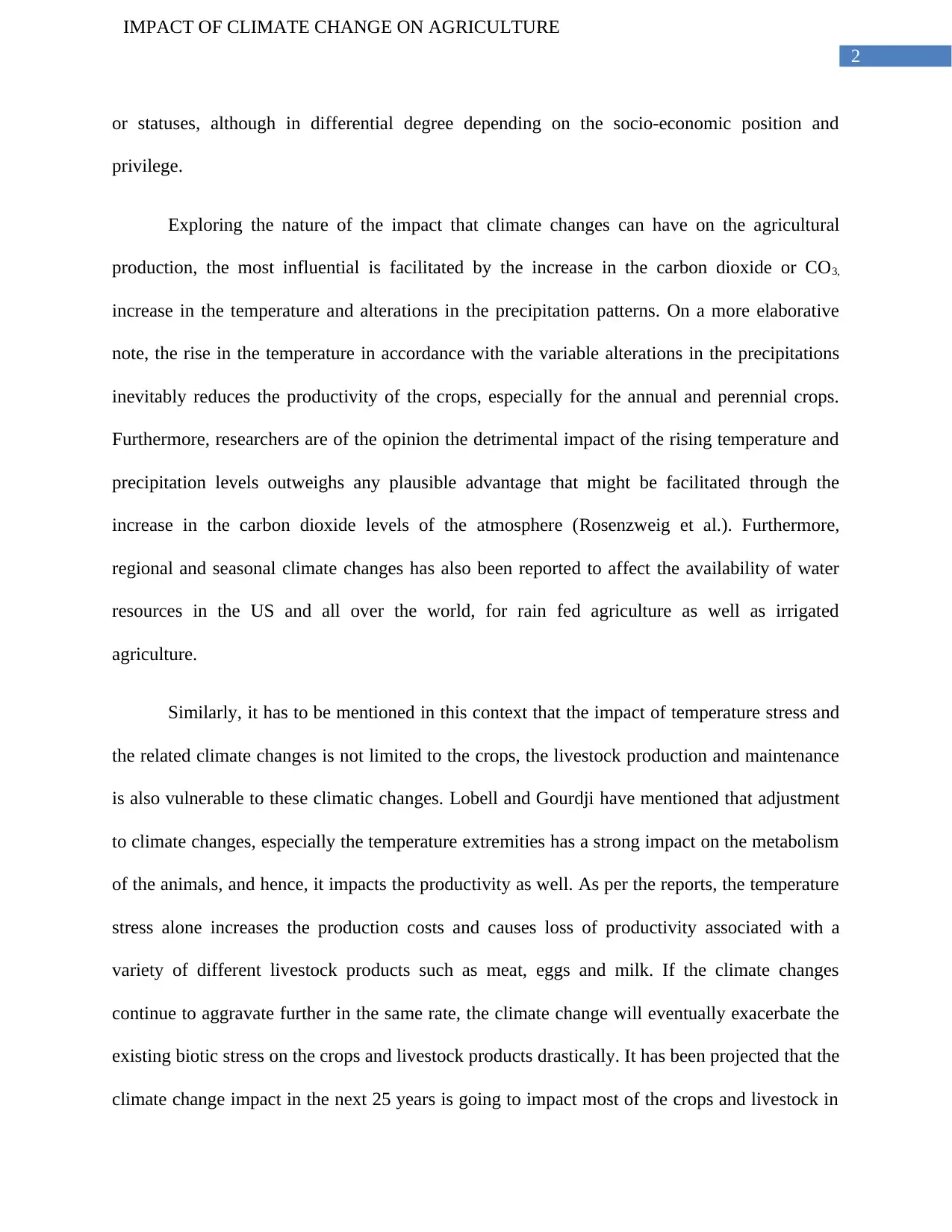
2
IMPACT OF CLIMATE CHANGE ON AGRICULTURE
or statuses, although in differential degree depending on the socio-economic position and
privilege.
Exploring the nature of the impact that climate changes can have on the agricultural
production, the most influential is facilitated by the increase in the carbon dioxide or CO3,
increase in the temperature and alterations in the precipitation patterns. On a more elaborative
note, the rise in the temperature in accordance with the variable alterations in the precipitations
inevitably reduces the productivity of the crops, especially for the annual and perennial crops.
Furthermore, researchers are of the opinion the detrimental impact of the rising temperature and
precipitation levels outweighs any plausible advantage that might be facilitated through the
increase in the carbon dioxide levels of the atmosphere (Rosenzweig et al.). Furthermore,
regional and seasonal climate changes has also been reported to affect the availability of water
resources in the US and all over the world, for rain fed agriculture as well as irrigated
agriculture.
Similarly, it has to be mentioned in this context that the impact of temperature stress and
the related climate changes is not limited to the crops, the livestock production and maintenance
is also vulnerable to these climatic changes. Lobell and Gourdji have mentioned that adjustment
to climate changes, especially the temperature extremities has a strong impact on the metabolism
of the animals, and hence, it impacts the productivity as well. As per the reports, the temperature
stress alone increases the production costs and causes loss of productivity associated with a
variety of different livestock products such as meat, eggs and milk. If the climate changes
continue to aggravate further in the same rate, the climate change will eventually exacerbate the
existing biotic stress on the crops and livestock products drastically. It has been projected that the
climate change impact in the next 25 years is going to impact most of the crops and livestock in
IMPACT OF CLIMATE CHANGE ON AGRICULTURE
or statuses, although in differential degree depending on the socio-economic position and
privilege.
Exploring the nature of the impact that climate changes can have on the agricultural
production, the most influential is facilitated by the increase in the carbon dioxide or CO3,
increase in the temperature and alterations in the precipitation patterns. On a more elaborative
note, the rise in the temperature in accordance with the variable alterations in the precipitations
inevitably reduces the productivity of the crops, especially for the annual and perennial crops.
Furthermore, researchers are of the opinion the detrimental impact of the rising temperature and
precipitation levels outweighs any plausible advantage that might be facilitated through the
increase in the carbon dioxide levels of the atmosphere (Rosenzweig et al.). Furthermore,
regional and seasonal climate changes has also been reported to affect the availability of water
resources in the US and all over the world, for rain fed agriculture as well as irrigated
agriculture.
Similarly, it has to be mentioned in this context that the impact of temperature stress and
the related climate changes is not limited to the crops, the livestock production and maintenance
is also vulnerable to these climatic changes. Lobell and Gourdji have mentioned that adjustment
to climate changes, especially the temperature extremities has a strong impact on the metabolism
of the animals, and hence, it impacts the productivity as well. As per the reports, the temperature
stress alone increases the production costs and causes loss of productivity associated with a
variety of different livestock products such as meat, eggs and milk. If the climate changes
continue to aggravate further in the same rate, the climate change will eventually exacerbate the
existing biotic stress on the crops and livestock products drastically. It has been projected that the
climate change impact in the next 25 years is going to impact most of the crops and livestock in
⊘ This is a preview!⊘
Do you want full access?
Subscribe today to unlock all pages.

Trusted by 1+ million students worldwide
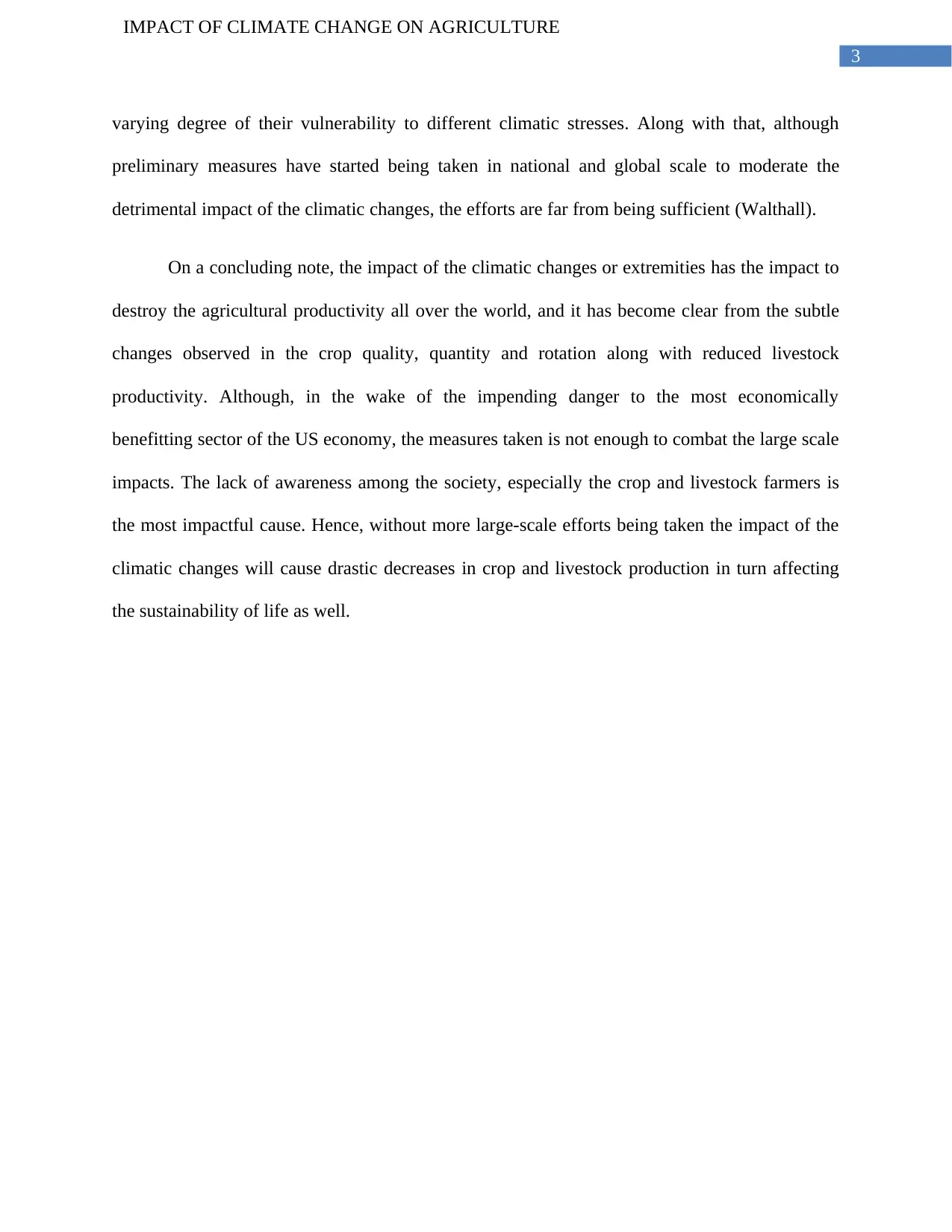
3
IMPACT OF CLIMATE CHANGE ON AGRICULTURE
varying degree of their vulnerability to different climatic stresses. Along with that, although
preliminary measures have started being taken in national and global scale to moderate the
detrimental impact of the climatic changes, the efforts are far from being sufficient (Walthall).
On a concluding note, the impact of the climatic changes or extremities has the impact to
destroy the agricultural productivity all over the world, and it has become clear from the subtle
changes observed in the crop quality, quantity and rotation along with reduced livestock
productivity. Although, in the wake of the impending danger to the most economically
benefitting sector of the US economy, the measures taken is not enough to combat the large scale
impacts. The lack of awareness among the society, especially the crop and livestock farmers is
the most impactful cause. Hence, without more large-scale efforts being taken the impact of the
climatic changes will cause drastic decreases in crop and livestock production in turn affecting
the sustainability of life as well.
IMPACT OF CLIMATE CHANGE ON AGRICULTURE
varying degree of their vulnerability to different climatic stresses. Along with that, although
preliminary measures have started being taken in national and global scale to moderate the
detrimental impact of the climatic changes, the efforts are far from being sufficient (Walthall).
On a concluding note, the impact of the climatic changes or extremities has the impact to
destroy the agricultural productivity all over the world, and it has become clear from the subtle
changes observed in the crop quality, quantity and rotation along with reduced livestock
productivity. Although, in the wake of the impending danger to the most economically
benefitting sector of the US economy, the measures taken is not enough to combat the large scale
impacts. The lack of awareness among the society, especially the crop and livestock farmers is
the most impactful cause. Hence, without more large-scale efforts being taken the impact of the
climatic changes will cause drastic decreases in crop and livestock production in turn affecting
the sustainability of life as well.
Paraphrase This Document
Need a fresh take? Get an instant paraphrase of this document with our AI Paraphraser
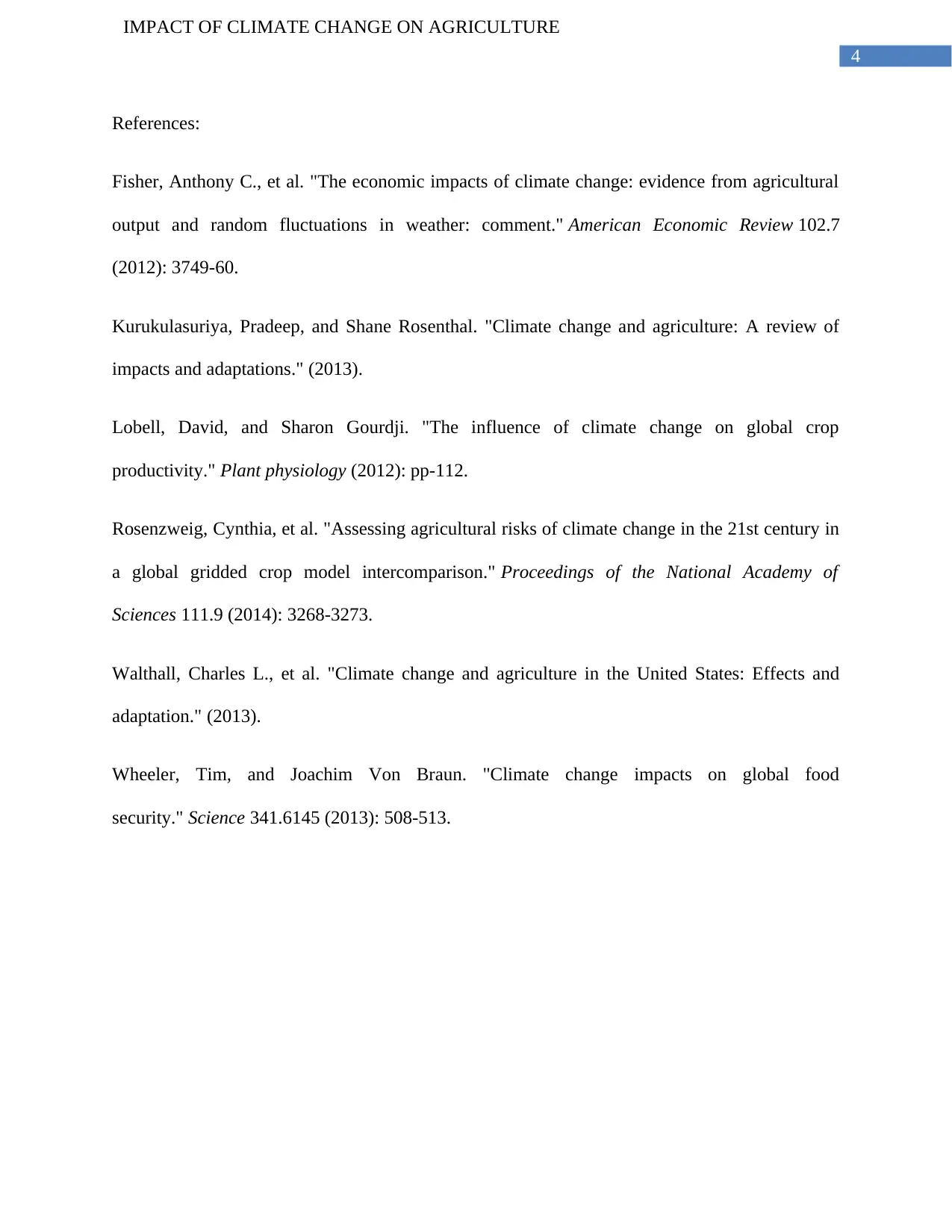
4
IMPACT OF CLIMATE CHANGE ON AGRICULTURE
References:
Fisher, Anthony C., et al. "The economic impacts of climate change: evidence from agricultural
output and random fluctuations in weather: comment." American Economic Review 102.7
(2012): 3749-60.
Kurukulasuriya, Pradeep, and Shane Rosenthal. "Climate change and agriculture: A review of
impacts and adaptations." (2013).
Lobell, David, and Sharon Gourdji. "The influence of climate change on global crop
productivity." Plant physiology (2012): pp-112.
Rosenzweig, Cynthia, et al. "Assessing agricultural risks of climate change in the 21st century in
a global gridded crop model intercomparison." Proceedings of the National Academy of
Sciences 111.9 (2014): 3268-3273.
Walthall, Charles L., et al. "Climate change and agriculture in the United States: Effects and
adaptation." (2013).
Wheeler, Tim, and Joachim Von Braun. "Climate change impacts on global food
security." Science 341.6145 (2013): 508-513.
IMPACT OF CLIMATE CHANGE ON AGRICULTURE
References:
Fisher, Anthony C., et al. "The economic impacts of climate change: evidence from agricultural
output and random fluctuations in weather: comment." American Economic Review 102.7
(2012): 3749-60.
Kurukulasuriya, Pradeep, and Shane Rosenthal. "Climate change and agriculture: A review of
impacts and adaptations." (2013).
Lobell, David, and Sharon Gourdji. "The influence of climate change on global crop
productivity." Plant physiology (2012): pp-112.
Rosenzweig, Cynthia, et al. "Assessing agricultural risks of climate change in the 21st century in
a global gridded crop model intercomparison." Proceedings of the National Academy of
Sciences 111.9 (2014): 3268-3273.
Walthall, Charles L., et al. "Climate change and agriculture in the United States: Effects and
adaptation." (2013).
Wheeler, Tim, and Joachim Von Braun. "Climate change impacts on global food
security." Science 341.6145 (2013): 508-513.
1 out of 5
Related Documents
Your All-in-One AI-Powered Toolkit for Academic Success.
+13062052269
info@desklib.com
Available 24*7 on WhatsApp / Email
![[object Object]](/_next/static/media/star-bottom.7253800d.svg)
Unlock your academic potential
Copyright © 2020–2025 A2Z Services. All Rights Reserved. Developed and managed by ZUCOL.




